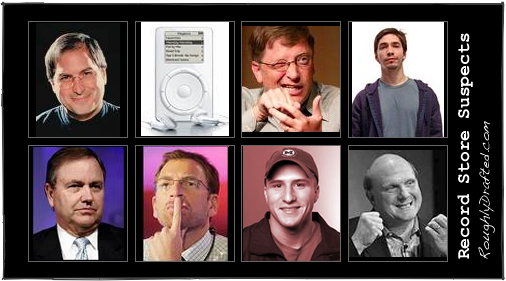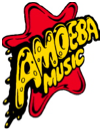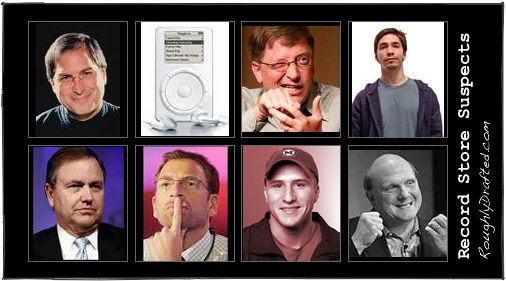

Readers Write: Did iTunes Kill the Record Store?
Responding to Did iTunes Kill the Record Store? readers wrote about successful record stores, the similar plight of book sellers in the shadow of Wal-Mart, music piracy and file sharing.
DP: I am surprised that you did not mention Amoeba Music. They may be very small (3 locations) but are thriving because they realized that they are selling the experience of buying music, not the CDs themselves.
This has translated into an amazing amount of foot traffic and an incredible social atmosphere. They entice customers with low-priced used CD prices yet still sell higher-priced new CDs once the customer is in the store.
Yes I like Amoeba too - I used to live just up the street from the store in the Upper Haight. There are a number of small chains or individual stores that are doing just fine, operating in a sweet spot as you describe.
Surviving record stores are commonly found in urban markets like Amoeba’s San Francisco, Berkeley, and Hollywood locations, where there are no Wal-Marts, expressly because residents don't want to trade unique stores like Amoeba for the nauseating monotony of Wal-Mart and other big box retail chains.
Book stores and Armadillo Music
SD: I just read your "Did iTunes Kill the Record Store?" article and I want to point out the parallels between the small local record store and the small local book store. I'm curious as to whether the numbers are similar.
Off the top of my head, I would guess that internet purchases of books are much higher and electronic downloads almost nonexistent, but the big-box stores are the real culprit. In our town, Woodland, CA, it's Wal-Mart and Target and the promise of a Costco in the coming years. The victim is our beloved The Next Chapter Bookstore.
I don't think that Woodland even has a local music store. Armadillo Music in Davis is great, though; they have listening stations and let you listen to any CD before you buy it... new or used or even special orders. Pretty cool! You don't get THAT at Wal-Mart.
Adam Drew writes: I moved to North Carolina from Boston, Massachusetts. In Boston, though I owned an iPod, I purchased all of my music from a chain called Newbury Comics. It's a small regional chain of entertainment stores in the metro Boston area.
The selection is incredible, they offer used CD's (which I love), the prices are competitive with the Big Boxes, the atmosphere is incredible, and the staff is always awesome. I was as loyal as they come to Newbury Comics and purchased all of my music, DVDs, and other assorted items (stickers, posters, comics, etc.) from NC.
When I moved to North Carolina last year I was shocked to find that there was no concept of a record store here. When I asked where people bought their music they all said Wal-Mart, Target, and Best Buy. I tried looking there, but the selection was atrocious.
I listen to a large range of music, ranging well into the marginal and eclectic. I could find the most popular albums by 3 or 4 of the bands I like, but I buy entire collections, it was useless trying to find anything but the biggest hits. I was despondent.
I had stayed away from iTunes Music Store. Even though I love my iPod, I always liked having the albums themselves as display pieces and permanent backups. I turned to iTS on the hunt for a few albums that were not in stores down here. iTS had them all, and at good prices. I now buy all of my music from iTunes.
iTunes didn't kill the record store, they rescued it. If it wasn't for the iTS I'd have nowhere to buy music, and I would be forced to labor incessantly to download crappy pirated versions, and not supporting the artists I love. I can't think of much worse for a music fan.
Arr, Shiver Me Timbers
JIM: Why do you not address the obvious--piracy--in this article?
MU: Shouldn't illegal downloads at least be mentioned? As far as I think they still outnumber iTunes downloads and are in some way a force to be reckoned with. As with pirated software, I think illegal downloads do not necessarily replace legal purchases, so they cannot be put into the equation 1:1. But I think they should at least be mentioned.
Even assuming that piracy has limited the growth of albums and the number of albums sold, there is still a huge market for CDs. The problem for the record stores that are going under is that buyers are not eager to pay list price for CDs, since they are available cheaper from big box discounters.
There actually was a subtle mention of piracy in the article: the basic premise of the article was questioning whether iPods enable piracy, thus destroying the market for music.
Two of the eight suspects pictured--the first generation iPod and Shawn Fanning, founder of the original Napster site--put piracy in the lineup.
The other suspects pictured--Steve Jobs on perhaps acid, Bill Gates in a Dr Evil pose, Justin Long dressed up as Mac, Wal-Mart CEO and third world exploiter Lee Scott, Warner Music CEO and killer piñata Edgar Bronfman Jr., and crazy goof but hard to love Steve Ballmer--are presumably all rich enough to pay for CDs.
Is Piracy Real?
Various music industry trade groups claim that piracy is killing their industry, and are suing file traders and the sites they use. Are music sales, revenue, and profits down? Are MP3 downloads preventing music sales or do they instead help advertise new music? Are paid music downloads profitable or are they still insignificant?
The next article takes a look: Is Piracy Really Killing the Music Industry?
Like reading RoughlyDrafted? Share articles with your friends, link from your blog, and subscribe to my podcast!
Did I miss any details?
Next Articles:
This Series


 |
|
 |
|
 Del.icio.us |
Del.icio.us |
 Technorati |
About RDM |
Forum : Feed |
Technorati |
About RDM |
Forum : Feed |

Tuesday, March 6, 2007






 Send Link
Send Link Reddit
Reddit Slashdot
Slashdot NewsTrust
NewsTrust





